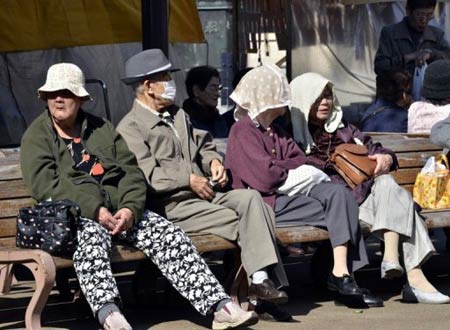|
 File picture shows a group of elderly people resting on a bench in Tokyo. Japanese researchers on Friday unveiled a population clock that showed the nation's people could theoretically become extinct in 1,000 years because of declining birth rates |
|
Japanese researchers on Friday unveiled a population clock that showed the nation's people could theoretically become extinct in 1,000 years because of declining birth rates. Academics in the northern city of Sendai said that Japan's population of children aged up to 14, which now stands at 16.6 million, is shrinking at the rate of one every 100 seconds. Their extrapolations pointed to a Japan with no children left within a millennium. "If the rate of decline continues, we will be able to celebrate the Children's Day public holiday on May 5, 3011 as there will be one child," said Hiroshi Yoshida, an economics professor at Tohoku University. "But 100 seconds later there will be no children left," he said. "The overall trend is towards extinction, which started in 1975 when Japan's fertility rate fell below two." Yoshida said he created the population clock to encourage "urgent" discussion of the issue. Another study released earlier this year showed Japan's population is expected to shrink to a third of its current 127.7 million over the next century. Government projections show the birth rate will hit just 1.35 children per woman within 50 years, well below the replacement rate. Meanwhile, life expectancy -- already one of the highest in the world -- is expected to rise from 86.39 years in 2010 to 90.93 years in 2060 for women and from 79.64 years to 84.19 years for men. More than 20 percent of Japan's people are aged 65 or over, one of the highest proportions of elderly in the world. Japan has very little immigration and any suggestion of opening the borders to young workers who could help plug the population gap provokes strong reactions among the public. The greying population is a headache for policymakers who are faced with trying to ensure an ever-dwindling pool of workers can pay for a growing number of pensioners. But for some Japanese companies the inverting of the traditional ageing pyramid provides commercial opportunities. Unicharm said Friday that sales of its adult diapers had "slightly surpassed" those for babies in the financial year to March, for the first time since the company moved into the seniors market. (Read by Emily Cheng. Emily Cheng is a journalist at the China Daily Website.) (Agencies) |
日本研究人员上周五发布了一个人口倒计时钟,该时钟显示,由于出生率持续下降,理论上日本人将于1000年后灭绝。 日本北部城市仙台的学者称,日本14岁以下儿童人口目前为1660万,正在以每100秒1个的速度减少。 学者们的推断指出,日本在1000年后将没有儿童。 日本东北大学的经济学教授吉田浩说:“按这种下降速度,到3011年5月5日我们将剩下一名儿童,仍能庆祝儿童节。” 他说:“但再过100秒,日本将没有儿童。自从1975年日本生育率降到每名育龄妇女两个孩子以内,走向灭绝便成了总体趋势。” 吉田说他创立这一人口钟是为了鼓励人们“紧急”开展关于这一问题的讨论。 今年早些时候发布的另一项研究显示,下世纪日本人口将缩减到现有人口(1.277亿)的三分之一。 政府预测显示,50年内日本生育率将降至每名妇女1.35个小孩,大大低于人口替换率。 与此同时,日本已然是世界第一的人口寿命将进一步延长。日本女性的平均寿命将从2010年的86.39岁增加到2060年的90.93岁,而日本男性的寿命将从2010年的79.64岁增加到2060年的84.19岁。 超过20%的日本人年龄在65岁以上(含65岁),是世界上老年人口比例最大的国家之一。 日本的外来移民很少,向外国年轻工人开放边境能帮助填补人口差距,但这种提议总是会激起民众的强烈反应。 老龄化人口是让决策者头疼的事情,他们面临着如何用不断减少的劳动人口支付的养老金来养活越来越多的退休老人的问题。 然而,对一些日本公司而言,传统老龄化金字塔结构的这一倒转提供了商机。 日本尤妮佳公司上周五称,在截止到三月的上一个财政年度中,成人尿布的销量“略微超过了”婴儿尿布的销量,这在该公司进军老年人市场后是首次。 相关阅读 (中国日报网英语点津 陈丹妮 编辑:Julie) |
|
Vocabulary: extrapolation: 推断 |
